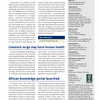Livestock surge may harm human health
Livestock intensification in developing countries, especially in Africa and Asia, may increase the incidence of epidemics that kill both humans and animals, the International Livestock Research Institute (ILRI) warns. Livestock numbers are rising sharply due to population growth and the rise in affluence, as both factors lead to increased demand for milk, meat and eggs.
The increase in density leads to increased contact between humans and animals - and hence to transmission of pathogens. Rapid urbanisation may worsen the situation, if diseases move with humans, from rural areas to cities. Agricultural intensification in the developing world is typically focused on increasing food production and profitability, while the potential effects on human health remain largely ignored, says John McDermott, deputy director general for research at ILRI.
Download this article in magazine layout
rural_2011_2_04.pdf195 KB




